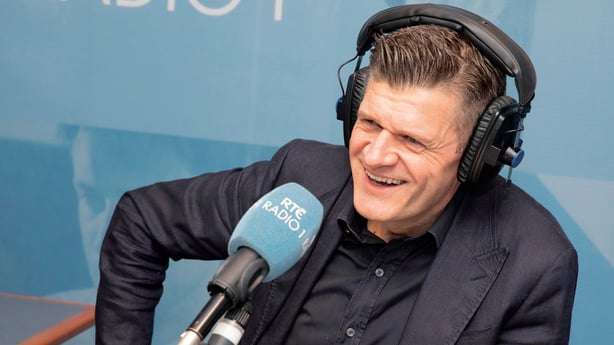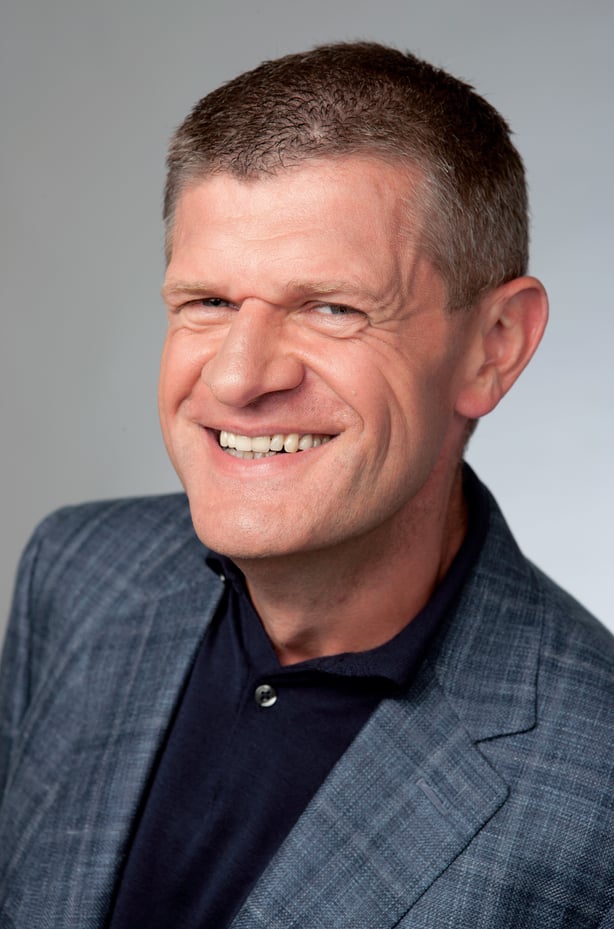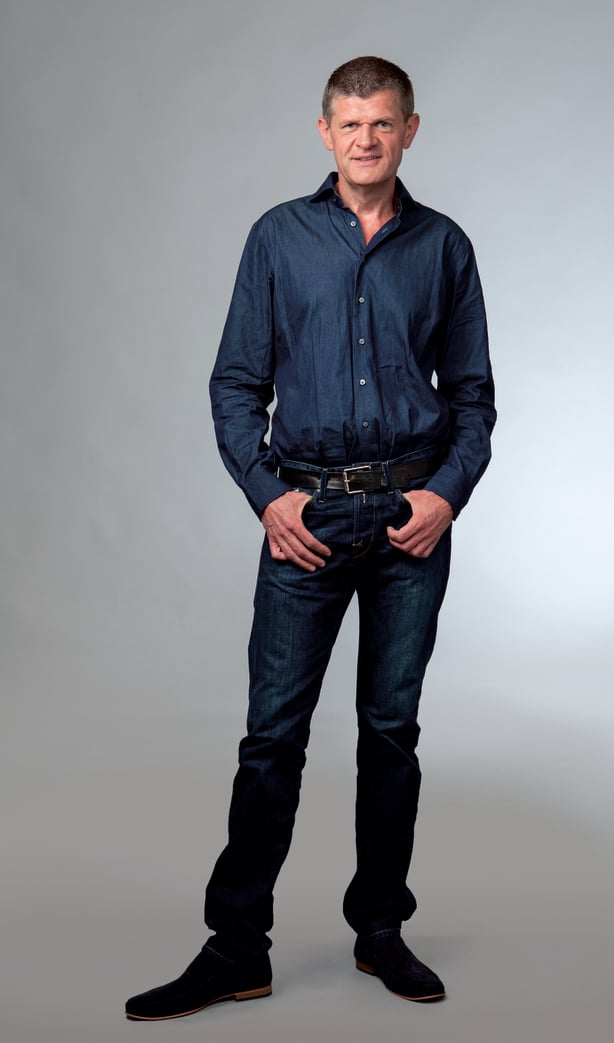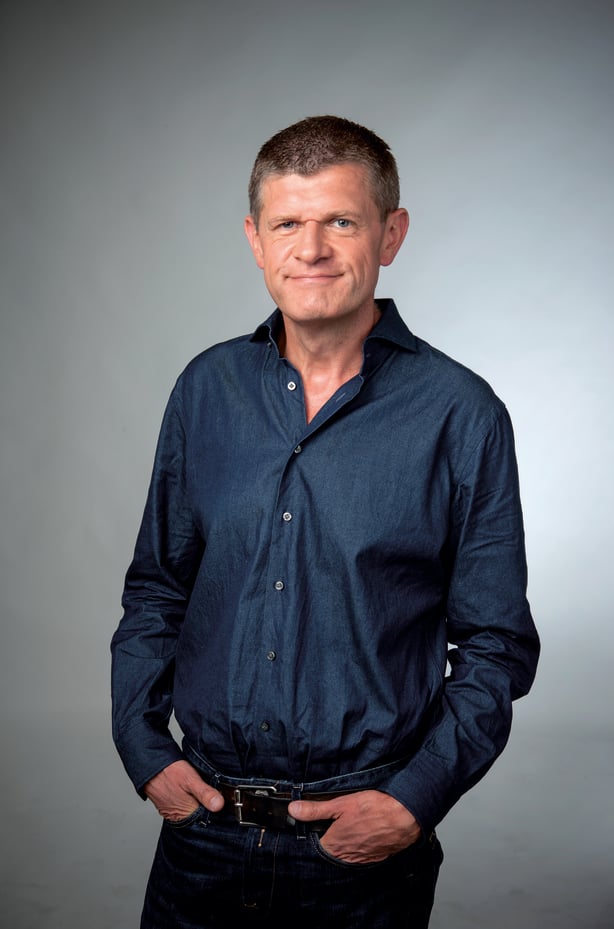Has broadcaster and journalist Brendan O'Connor found his natural home on radio? He talks to Donal O’Donoghue about shedding his wild ways, the joys of fatherhood and the wisdom of the wireless.
"One thing I’ve learned about myself over the past 15 months is the importance of calm," says Brendan O’Connor, sounding positively Zen following a weekend chewing the fat with Sinéad O’Connor, DJ-author Annie Mac and others on the RTÉ Radio One show with his name above the door.
"I wasn’t always a calm individual," he adds. "When I was younger, I would have seen a value in being hot-blooded about everything. It’s part of getting older, but I’ve especially realised over the past year and a half that staying calm is crucial, certainly in doing this show and also in life. I just wish it hadn’t taken me 50 years to learn that but I’m getting there now."
O’Connnor (51) was once an angry-ish young man. Or at least that was the Public Image. On TV adverts, he played up to this panto villain type, the big man with the glowering head, scaring kids in a supermarket. Of course, it was all a bit of fun too, the shtick of someone who was variously a comedian and a pop star (briefly) but earned his crust as a journalist and broadcaster.

Not that the bolshie Corkman didn’t have his opinions, doled out in print in the Sunday Independent (where he still chronicles his mid-life crises). "I was more reactive when I was a younger," he says. "I’m not saying that I’ve become Zen. I don’t think I’ll ever be that." But people change and sometimes it can happen in plain sight.
In February 2020, RTÉ announced Brendan O’Connor as Marian Finucane’s successor following her death. And in March, in the week that the country went into lockdown, he took over. "I hadn’t done a lot of radio to that point," he says, "so I don’t think that I’d ever figured out who I was as a broadcaster. In a weird way, the pandemic gave me cover to figure out who I was. It was a steep learning curve because when your name is over the door, the show stands or falls on you in many ways. There is the team, of course, without whom I’d be lost, but you do learn a lot about yourself. I think now that I’ve figured out my voice and who I am as a broadcaster."
Certainly O’Connor has put his own stamp on the weekend shows. His style is conversational, punctuated with colloquialisms like 'Come here!’ and ‘Listen’ whether talking mental health issues with Sinéad O’Connor, asking Salman Rushdie about his paedophile grandfather or quietly taking scientist Richard Dawkins to task.
Not that it’s all deep and dark; there is much lightness and levity too, and he always signs off with a carefully chosen piece of music ("a palate cleanser" as he puts it). "I’m not the most natural broadcaster in the world," he says. "I tend to overthink things too much in advance and afterwards I go over stuff saying ‘Why did I say that and I shouldn’t have done that’."

His poised interview with Dawkins garnered widespread praise, not least from Down Syndrome Ireland as he queried the controversial idea that bringing a child with Down syndrome into the world is immoral.
"In fairness, the guy was very honest," he says of Dawkins, who conceded a number of points. "I’m not in the business of ambushing anybody or getting a ‘Gotcha!’ moment. I don’t like that kind of broadcasting. If you’re just out to catch somebody out, no one will learn anything whereas if you let people talk, something might come of it. Maybe I’m getting soft in my old age, but I don’t think the be all and end all for any conversation on radio is to catch someone out or to win or whatever."
Of course, it’s not all plain sailing. Earlier this year, one newspaper headline said of the show: ‘A PC Brendan O’Connor? The RTÉ thought police must have got to him too.’ "I don’t think about being PC or not being PC," he says. "I’m just committed to people having a conversation and if they disagree with each other, hopefully they can express their views and not bite each other’s heads off. I think I’d be paralysed if I started taking on board everyone’s opinion. But I find that women of a certain age don’t give a f*** any more and they will come up and tell it to me straight, what they like and what they don’t. So I’m more inclined to listen to them than anyone else."
Yet maybe the RTÉ thought police, whoever they might be, have somehow filtered into his consciousness as he is untypically careful in this interview, frequently chaperoning the conversation back to his radio show and championing the team as crucial to its success. "Do you have enough there?" he says when we wrap after a lengthy chat. I'm not sure. You never are.
"The boss wanted me to have you say something controversial," I say. He laughs. "Listen, if you text me a topic I can give you a few controversial quotes if you like." It’s a decent gesture but it goes against the tide of our conversation, as well the grain of a broadcaster remade in recent times.

Brendan O’Connor became a dad at 38. Up to then, fatherhood was never high on his ‘must-do’ list. He and his wife Sarah now have two daughters, Anna and Mary. So what does fatherhood mean to him? He expels a long whooosh. "I’ve said it all before I suppose," he says. "It’s great even if it wasn’t something that I was madly chasing."
Could he ever imagine life being any other way now? "Ah you could sometimes, couldn’t you?" he says and laughs. "But the pros totally outweigh the cons. It’s a joy being a father. And one thing I’ve realised is that while my job gives me a sense of purpose, my kids have always given me a sense of purpose. And I believe you’re never going to be depressed if you have a sense of purpose."
Does he get depressed or down? "I imagine I’m like the majority of the people in the world in that I need to mind my mental health," he says, carefully picking his words on a subject that can be a minefield. "When the lockdown started, my wife said to me, ‘Why don’t you run?’ Back then, I couldn’t run ten yards and she got me to do the couch to 5K. Now I find that running is so good for the head. I probably went around really tightly wound up in my body for a long time and that wasn’t very helpful. I’m now learning to loosen up a bit. It all sounds like I’m a healthy living nut [he also sea swims, practices yoga and meditates]; it’s far from that, but for too long I didn’t pay enough attention to my body at all."
O’Connor lives in Dublin with his wife, Sarah Caden (fellow journalist with the Sunday Independent, where they first met) and their two young daughters. Last year, Anna started secondary school, while her younger sibling Mary, who has Down syndrome, attends mainstream education. In an Irish Times article on parenthood last December, O’Connor described his wife as "a f***ing lioness" – the person from whom his daughters get their strength and determination.

So what do they get from their dad? "I hope I give them a sense that they are safe and I try to give them, often against their will, the tools to be happy in the world," he says after a lengthy pause. "It’s hard for me to answer that because I’m too close but I’d like to think that I’m some use to them."
A joyful photograph of Anna and Mary, arms wrapped around each other as they gaze seawards, illustrated that Times piece. "Like most siblings, they are great old pals and on the other hand, they drive each other nuts," says their dad with a laugh. Does he worry about what the future might hold for them?
"My family live very much in the present, which is a good thing. That’s possibly connected to having Mary. As time goes on, it will be a question of doing whatever is right by Mary at that time. It’s like what Sarah says: ‘We don’t have Down syndrome and we don’t know what it’s like to have Down syndrome.’ So in a way, it’s not really our decision to make. Hopefully, we’ll be able to figure out the right thing for Mary when the time comes."
For now, he’s enjoying life (healthy mind, healthy body, healthy ratings) and his radio show, despite his anxieties about whether he is doing it right or not, is a big part of that. "This is the job that suits me better than any one I’ve ever done before," he says.
"Some other people might not think that, but that’s how I feel. Maybe that also has to do with reaching a certain age and getting a bit of sense. I really feel that this show feels so right and hopefully, we are producing something useful. That’s the other guiding star these days for me: if you feel useful, you will hopefully never feel down or depressed. If you feel useful, you feel good, don’t you?"
It’s also likely that O’Connor will return to TV at some point. Certainly, his award-winning current affairs chat show, Cutting Edge merits another outing (it was cancelled in 2019): a panel chewing over the issues of the day with yours truly as ringmaster.
So what gets under his skin these days? He laughs. "The great relief of taking a job as a presenter with RTÉ is that you’re not required to take sides on anything," he says. "You become like an anthropologist; you just observe everything and let the world go by (laughs). So I think that whenever I get cancelled off the radio, when I inevitably do something terrible, I believe that anthropology will be the next logical step for me. It’s the direction I’m moving in."
I reckon he’s already there.


